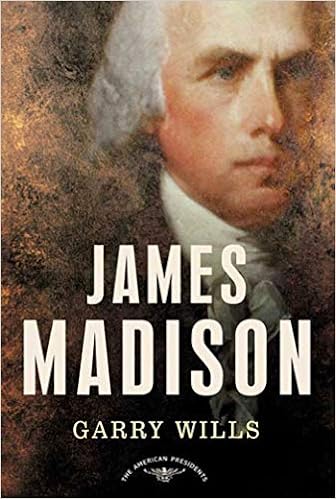Blogging once per year is probably not how you're supposed to do it. One might think living through the weirdness of a pandemic would provide ample time... but no. Instead, I've been outside gardening, running, reading, herding cats (literal cats), and as they say in commercials, "And so much more!" Occasionally working.
But in the random way I come up with things, I started thinking about how my Presidential knowledge was lacking -- I couldn't name them in order and some I just would completely forget (Van Buren? Fillmore?). So, of course, the answer is to read a biography/history of each President of the U.S. in order. I had a few under my belt: David McCullough's John Adams and Truman; Ron Chernow's Grant (also Grant's memoirs), Joseph Ellis' American Sphinx (Jefferson). I'll also count Garry Wills' Lincoln at Gettysburg, although I intend to read a fuller biography in his time.
Now, I don't think I can do 600+ pages on everyone, so I've been looking for solid but concise works by reputable historians. I began with good old Washington by the reliable Ellis. Don't need to know what all they ate for breakfast and every memo ever written -- just the good stuff, the important stuff. So far, I've been pleased with the American Presidents Series, edited by Arthur Schlesinger, Jr. and Sean Wilentz. These short biographies are just what I was looking for -- hitting the most important contributions while including enough of the life, character, and personality to make it interesting.
So far, I've read Garry Wills on Madison, Gary Hart on James Monroe, and Robert Remini on John Quincy Adams. I've just departed from the series to read Remini's biography of Andrew Jackson, since that copy was lying around the house. So that's where I am, rolling through the Founding Fathers and getting the big sweep of American history in all its problematic, ugly, surprising, rousing, and sometimes downright unbelievable weirdness.
One big takeaway so far, is that those early guys were downright obsessed with Alexander Hamilton. So at some point, I'll have to depart and finally read that biography. (I'm lagging behind the rest of the globe and still haven't even seen Hamilton the musical. Even so, I always see Lin Manuel in my mind's eye). Seriously, it was like he was the Devil to Republicans (old style, that is), and it becomes clear how someone eventually was going to murder the guy. Of course, they ended up adopting his ideas afterwards. (Burr -- another piece of work who I'll have to read more about later.)
A thing I like about this project is seeing the next holders of the office developing and working in the background during the term of their predecessors. I'm just now seeing that wily Martin Van Buren (!) working his angles in Jackson's administration. Jackson. Now there's a character. I have laughed aloud at Remini's descriptions of the various brawls and duels, often descending into what he calls "low comedy," especially when the horses ran away with the pistols as Jackson attempted to deal with John Sevier. Horses were like y'all need to calm the fuck down. And they really did.
Just as seeing the future presidents popping into the background of the current subject's term, I've also enjoyed the sidelight of recognizing the men whose names are very familiar to me as place names. Growing up in Virginia, near the Tennessee/Kentucky/North Carolina border, I see Alexander Smyth (Smyth County), Henry Tazewell, William Blount, John Sevier, Henry Wise, William Lenoir, Henry Clay... and the list goes on. It can really send you down a rabbit hole. One emerges from the hole sometimes wondering, should we be naming something after a guy who was expelled from the Senate for treason? Really? (That would be Blount, for the record.) So many shenanigans.
And of course, the most tragic and wrenching part is seeing, how, from the very beginning, without doubt, each President saw very clearly that slavery was going to be the thing that tore apart the union. It was so obvious that they kept putting it off for the next administration/generation to deal with. But they knew, and it gnawed at them because it was so diametrically opposed to the principles that the whole American enterprise stood for. At the same time, the treatment of Native Americans provides the other thread of woe. So needless to say, it puts a lot in perspective that has been glossed over, excused, ignored, and whitewashed in a lot of history classes in a lot of places. I remember what mine were like, and it's pretty groan-worthy.
As dismaying as the history sometimes is, I know it's important to revisit -- and in some cases, discover for the first time -- this deeply complicated origin story of America. It makes so many things clear. It puts the present sordid history in proper context. It exposes the roots of our most complex and most nonsensical arguments. I probably shouldn't even get started on the "well-regulated militia." Ask Washington how well regulated it was. Ask Monroe.
I'll continue to read along and I might even give an update every now and then. Possibly, I'll slow my pace at some point or spend time reading a real doorstopper. Meanwhile, Van Buren and Fillmore, here I come.

